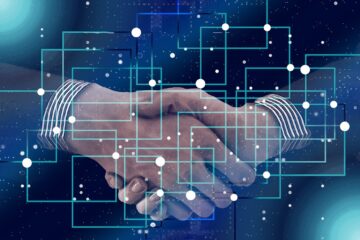![]()
Introduction:
Artificial Intelligence (AI) is the branch of computer programming involving the diffusion of human intellect into machinery learning, based on the human aspects of the performance of tasks. In simpler terms, it may be referred to as the filed of computer mechanics that are made to depict human intellect and for a much more efficient delivery of output. It is an interdisciplinary approach that has accounted for its ever-growing area of development.
Intermixing of AI components into the traditional work-fields of human capacity is essentially the breakthrough advancements in machine learning and deep learning, leading to virtual shifts in almost every sector of human force applications. Ever since the Industrialization of the 40s, the emergence of factories and machinery output gathered force to the present ever-growing quest for an automated workforce. Keeping in mind the laws of nature, a human is limited to its efficiency, which makes any human presumably subject to errors and incapability to perform an excellent execution of tasks. The fact that a human is bound by his strength and capacities that impact the execution of tasks, AI has been one of the sought after techniques to overcome the barriers of human intellect into human output.
One of the noble and traditional occupations of human intellect, Law, has been the witness of expanding new horizons of human intelligence and progress in the society. The professional lawyer is a duty that involves voluminous analysis and creation of documents and content, that has been inclusive of history to the present incorporating hundreds of thousands of documentations. Multiple legal tasks, including counseling clients, relevancy and legality, avoiding risk, drafting contracts and other documents, pursuing litigation are all scopes of works that a law professional has to deal in day to day basis, with expectations of the finest output without chances of error.
In such a diversity of tasks, that require possession of multiple intellectual profiles, humans, in the end, do not function as a machine and therefore, have been burdened with new challenges in a dynamic society. The solution to cater to human-alike capabilities with capacities beyond human limits is the involvement of the elements of AI to perform tasks with a much more efficient, faster, and legitimate operation.
AI and Law
The domain of work for a legal practitioner is one of immense research and application of intellect on a platform with no definite limitation as in the case of other sciences. In modern litigation, work amounts to obtaining and reviewing large troves of documents turned over by the opposing counsel. AI-augmented applications and programs are the focus of legal development in the contemporary era. In the mid-2000s, the arrival of electronic discovery, predictive coding, and technology-assisted review became possible, resulting in the creation of computer-based document-review techniques that aim to automatically distinguish between litigation-discovery documents to examine their relevancy into the proceedings. More recently, these predictive-coding technologies have employed AI techniques, such as machine learning and knowledge representation, to help automate this activity.
Today, it is interesting to see firms that have been engaged in the development of legal-based AI. Companies such as Legal Robot, a San Francisco based AI company, aims to develop a contract analysis program, while on the other hand, LawGeex is a program aimed at defining the validity of contracts while conforming to the existing guidelines. AI’s present capability is visualized in automating a number of high-volume, recurring tasks.
The scope of AI is not restricted to efficiency to reduce the workload of lawyers in quick analysis and review based mechanisms, it further takes a leap onto the ongoing developments of prediction technology. In order to draw out the efficiency of prediction algorithms in law, a group of experts from Washington University had conducted a statistical analysis of their prediction algorithm in 2002, which aimed at the prediction of outcomes of the Supreme Court cases. In the findings, it was concluded that the forecast of outcomes by the algorithm proved to be 75% accurate, while compared to the other team of expert opinions’ which stood at 59% accuracy.
Is AI a replacement for lawyers?
The reaches of an augmented program in the form of an AI is yet to be discovered, making it one of the most breakthrough projects of human intellect, though still in the development phase. It is not absurd to visualize an era of forces of AI in the most common phases of a human force.
There exists an ocean of views in regards to the capabilities of AI, with pro-AI experts dreaming of a less human interfered workforce and the revolutions of AI competitiveness. On the contrast, it is not surprising to decipher anti-AI views that propel around the dis-function of Humans to sustain themselves. However, the idea revolves, in the present scenario, around the possibility of whether AI is a replacement for lawyers.
Artificial Intelligence in itself is multi-diverse, ranging from Humanoid Robots to computer programming. It is very crucial to understand that design of an AI has varied elements for usage-specific requirements. The development of an AI, in terms of professional application, majorly revolves around the usage of a self-sustained programming to be equipped with the dynamics of the nature of the work. In the application of AI in respect to the Lawyers, it is a real possibility to see the traditional chambers and modus operandi equipped with technological applications of inbuilt-AI programs and devices. Around the world, there have been firms engaged in the successful creation of an AI-based programming interface to assist lawyers on a variety of dynamics of their nature, ranging from proofreading of contracts to detection of faulty clauses and beyond.
Nonetheless, it is very much agreed to say that the actual purpose of the creation of AI in the domain of law, is to assist the legal practitioner, paralegals, and other fields of law. The aim is to reduce the workload of the lawyers and divert their limited energies in the meaningful application into the law, rather than be burdened with reviews of bulky data, which makes them vulnerable to missing out valuable details, and thus, at times creating errors.
Thus, it is safe to say that AI and Human lawyers are said to be placed in an ecosystem of inter-dependence, than of domination of AI, since the machine learning program is designed upon the patters and nature of the work assigned.
How near is the future?
AI-based programs are not yet capable of decision making that involve understanding the law and the facts and dealing with strategy, rather use patterns and heuristics to filter out documents to reserve the limited attorney-judgment time. Many sophisticated AI systems still require humans in the loop, human cognition is likely to be difficult to replace given the current state of AI technology.
Deep legal expertise, as well as the successful creation of programs, is required to initiate the creation of technology that operates in the legal space, as per the nature of diverse functions.
AI seems to be a revolutionary into bringing changes into the legal profession, however, it is plausible to say that in the equipment of AI-based programs in the traditional workforce would require lawyers to possess an additional set of skills to make use of such technology to remain competitive in the domain.
The creation of employment in terms of Data Analysts is one of the key advantages for a country aiming at the development of its Annual GDP. However, it would put the Law firms in a compulsion to build their own engineering departments and product teams, to tap into the database and generate insights to improve the practice of law.
Conclusion
Digitization is a process that is irreversible, so is the upcoming trends of AI. Augmented programs in varied sciences is the future of human civilizations to come. Clearly, the process of transition of AI into the Legal domain is unclear, however, the fact of the rapid growth and development of the human intellect, it is possible to prepare for the automation of human force.
Human expertise is undoubtedly irreplaceable to some extent, yet the future holds for an automation of a huge bedrock of litigation, with the changing nature of legal knowledge.



0 Comments